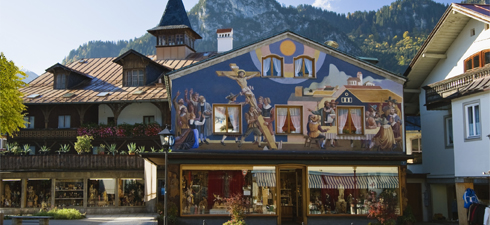The residents of Oberammergau must be nuts! From the foot of Kofel to the cross that marks its 1,342 metre-high summit, the modern world has been held at bay by people who have no time for such frivolity. The village is so old-fashioned, even the web cafe seems out of place.
And as if all this was not strange enough, every ten years the locals perform a Passion Play presenting the last five days of the life of Christ: a vast production that lasts from May to October which suddenly brings the rest of the world into the village located on a marvellous scenic route through the German Alps.
The Oberammergau Passion Play is almost an affair of state. For a whole five months, half of the village takes to the stage, and the slightest modification in a detail of the performance is the subject of heated debate and analysis, which on occasion have to be settled by a referendum. Most recently this was the case when villagers voted on whether or not the play should be staged in the evening rather than during the day.
Eight hundred actors on stage
Approximately 2,400 of the village's 5,000 inhabitants eagerly take on roles in the cast of characters. It offers them the opportunity not only to stage the Passion, but also to express a passion for theatre.
What makes Oberammergau the oddest place in Bavaria, and perhaps on the planet, is the fact that there is nothing like it anywhere else in the world. In the village, the locals never speak of years in terms of dates, but in terms of theatrical seasons. For an event that happened in 2001, they will say, "It was just after the 2000 Passion," and so on.
In such a huge production with 800 people on stage, if it's not 1,000, and occasional parts for camels and horses, you might be forgiven for thinking that you can just arrive and walk into the role of Jesus, but only people who were born in Oberammergau, or those who have married into the village or who have lived there for 20 years are allowed to be part of the show. It is not just a play, but a tradition that has kept alive a legend that dates back four centuries.
A 100 million euro turnover
In 1632, when bubonic plague spread across the mountains and claimed the lives of 84 residents of Oberammergau, the villagers were convinced they had been abandoned by God. In 1633, local councillors decided that the Almighty would protect them from the epidemic if local residents pledged to perform "the Mystery of the Passion, Death and Resurrection of Our Lord Jesus-Christ" every ten years.
The death rate slowly dwindled until the plague disappeared in 1633. Believing that their prayers had been answered, the locals honoured their promise at Whitsuntide in 1634, when they performed the first Passion Play in the parish cemetery. Two hundred years later, the stage was moved to the "Passion Meadow," where little by little it grew in size until it was finally housed in an imposing theatre built in 1929.
The Passionsspiele is now a world-renowned event and a major source of revenue for the village, which has no other major industries. The production budget for the 2010 Passion Play will be 32 million euros, which is expected to generate a turnover of 100 million euros.
However, this year the event, which is wholly self-financed, may have to contend with fallout from the economic crisis, which has undermined the American ticket market to the point where the organisers can no longer count on the 100% sales they have come to expect.
Growing a beard is an honour
Geographically, Oberammergau is situated at the southern edge of the Bavarian region known as Pfaffenwinkel, which literally translates as "Priests' corner," and it has everything you might expect from such a spiritual location. With its picture book Bavarian architecture, floral balconies and baroque churches with onion domed steeples, it has all the charm of a year-round Christmas market.
Starting in mid-May, the village, which only has population of 5,000, welcomes 5,000 visitors day. Given that there are five performances of the Passion Play every week, this amounts to half a million visitors in the course of the season which runs until October.
At around 10pm, the streets are filled with bearded locals on their way home from rehearsals, all of whom appear older than they would in real life. Half of the men in the village have not shaved for more than 15 months, and they are now blessed with the hippy air of disciples and apostles.
That is how things are done here. The decree was published on Ash Wednesday of last year: "The village authorities request that all of the actors let their hair grow, and in particular, male actors should grow their beards. Signed: the Mayor and Theatrical Director." For the inhabitants of Oberammergau, wearing a beard is an honour, as is rehearsing for free. After two and a half years of intense preparation, redemption is at hand.
Was this article useful? If so we are delighted!
It is freely available because we believe that the right to free and independent information is essential for democracy. But this right is not guaranteed forever, and independence comes at a cost. We need your support in order to continue publishing independent, multilingual news for all Europeans.
Discover our subscription offers and their exclusive benefits and become a member of our community now!












